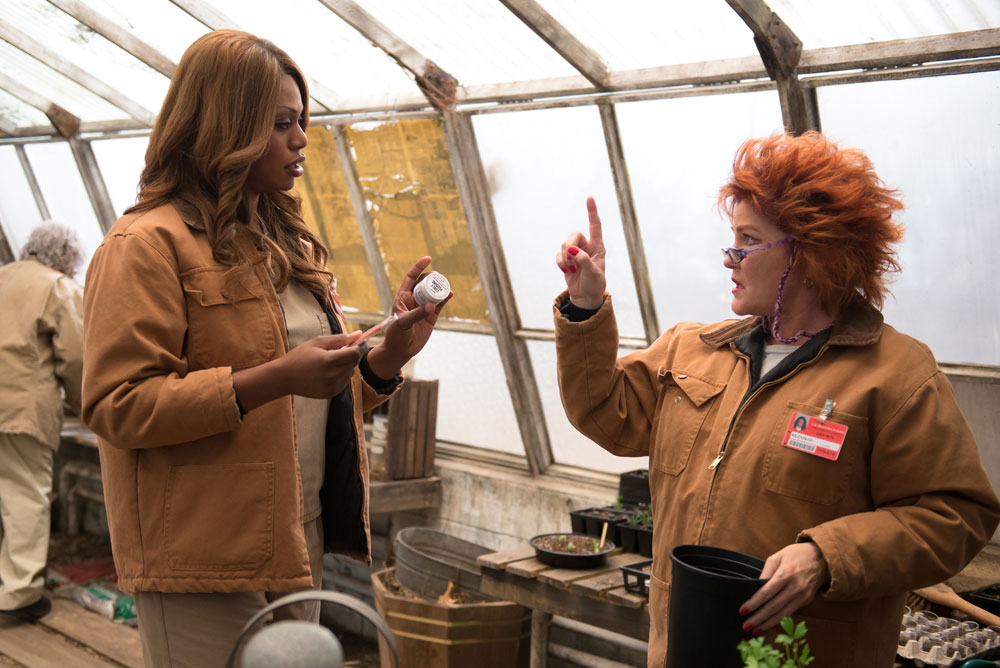 Laverne Cox and Kate Mulgrew in Netflix’s “Orange is the New Black”
Laverne Cox and Kate Mulgrew in Netflix’s “Orange is the New Black”
“If you don’t believe in a future it’s because you don’t think you’ll have one.”
That one line from Vee to Cindy pretty much nails every single inmate in Litchfield. It’s a place stacked to the rafters with people who think they have no future. That’s what makes sociopaths like Vee so scary; they’re eerily observant of people and can find the universality in their experiences and then exploit them. In other words, they can be tellers of truths, even as they spew one lie and falsehood after another.
But Vee’s brand new cigarette business is doing well. “You give these women something that they want, and they’ll respect you for it,” she tells her team. There’s something of a philosophical argument going on between Vee and Red, as they both scramble to secure power in this setting. For Red, power comes from having a prison family around her; a team of people who trust her that she can rely on. For her, contraband dealing is a means to that end. But for Vee, power comes from having something that other people want. It’s important to Red that she be in a position to shower her family with gifts in order to secure their loyalty. It’s important to Vee that she be in a position above everyone around her in order to manipulate them into doing or buying what she tells them to. Red is an emotionally abusive parent figure; self-absorbed, emotionally withholding, and lavish when it suits her. Vee is a classic pusher; constantly zeroing in on weaknesses and then twisting the knife to get people to do what she wants; buy what she has. It’s to the show’s enormous credit that a basic prison power struggle is addressing and tackling so many aspects of modern life, from race, to power, to family, to identity.
Cindy gets her flashback this episode and like Lorna’s, it served as a jarring reminder that some of these ladies, no matter how entertaining they are as inmates, are real assholes in the outside world. To an almost shocking degree, she was shown to be irresponsible and self-absorbed, leaving her sister/daughter alone in a car while she runs upstairs to get high with friends or constantly abusing her position as a TSA agent, in a manner that taps into real fears people have about the security state in this country. On the one hand, it was disappointing, since Poussey, Janae and Taystee have all been shown to be such easy characters to root for or empathize with in their backstories. With Cindy, you get a character who, up until now has been played mostly as charming comic relief (“They were so evil, even their cows had to be killed” remains one of our favorite lines of season one, just because of her perfect delivery) skating right up to the line of repulsive. It’s another bold move on the part of the writers, but rather than make us dislike Cindy, it makes us wonder if she isn’t a better person in prison than she is in the outside world. On the other hand, “I can’t let you on the plane with these guns” was hilarious.
The rest of the episode felt like a brisk, well executed mid-season plotting episode, moving things along on several fronts, making the show feel very much at this point like it’s got a strong game plan for the rest of the season.
Caputo understandably freaks out over Jimmy’s escape last episode and comes down hard on the rest of the COs; ordering a minimum of five shots a week from each of them, except Fischer, who gets a six-shot order, for having the poor taste to flirt with Luzchek. Because this is prison, the shots almost immediately start getting handed out on a racial basis, as in, the black inmates are automatically getting more of them, for the most innocuous of reasons. It’s possible they’re only perceiving it that way, as pretty much anything from punishments to rewards gets assessed and resented based along racial lines at the Litch, but we still fear there’ll be rioting before this is all over, based on how much resentment seems to be boiling right now.
If we were writing the Litchfield newsletter, this would be the part where we report that:
Nikki and Poussey have a great little unexpected bonding moment over what it’s like to be the gay girl with a serious crush on her straight girlfriend, a reference point that almost any gay person can relate to. Poussey insists she doesn’t have a crush on Taystee, to which Nikki astutely replies. “Sure. Let’s go with that.”
Lorna wants to “stay away from the romance-type stuff; just for now.”
Gloria wants to stay away from Vee and Red’s turf war. She and Red seem to have come to a begrudging and respectful truce with each other.
The Golden Girls keep trying to cover for Jimmy’s dementia, but it’s become impossible to hide the obvious. Caputo, who’s becoming both more sympathetic and more of a jerk at the same time, winds up shipping her out to basically live on the streets, in an appalling (and real world) practice called, in the best Orwellian manner, “Compassionate Release.”
Figueroa gets a moment to have her story fleshed out and frankly, it annoyed the hell out of us. The problem with her character is that she’s always been written and played just a little too broadly, turning her into a flat, but occasionally entertaining villain. This scene felt like a too-obvious attempt to give her some depth in the laziest way possible: a gay husband who doesn’t make her feel desirable. It’s such a cliche to reduce a ball-busting bitch character down to someone who just wants to be held. Even worse, there was this weird attempt to give her depth by trying to claim she’s more interested in the injustice of sentencing laws than fixing their showers. Sure, it’s a self-serving justification from someone who’s been embezzling like crazy, but it was somewhat awkwardly phrased.
And finally, the “Spanish” girls push Bennett a little too hard, with their constant requests for contraband (Flaca wants gay porn because she’s not into exploiting women and shit) and their blackmail threats, which is just one more reason to consider this whole supposed “romance” to be completely fucked up on all sides. Everything in prison comes down to some sort of power struggle and Daya’s pregnancy is no different. Her prison family (including her own mother), exploit Bennett because he’s in an untenable position. When pushed too far, he turns around and uses the institutional power at his command to punish the women in the worst way he can, by sending them to SHU. As Daya angrily points out to him: “You have choice. You have power. I’m an inmate. I have nothing.”
That’s what it’s all been about this season: power, and how it’s wielded.
[Photo Credit: Ali Goldstein for Netflix]
Li Bingbing in Erdem at the “Transformers: Age of Extinction” Beijing Premiere Next Post:
Olivia Munn in Peter Pilotto in New York City
Please review our Community Guidelines before posting a comment. Thank you!



